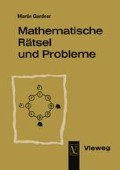Zusammenfassung
Ein Rätsel, dessen Lösung nur deduktives Denken mit wenig oder überhaupt keiner Zahlenrechnerei voraussetzt, wird gewöhnlich als logisches Problem bezeichnet. Natürlich sind derartige logische Probleme mathematisch in dem Sinne, als man Logik als die allgemeinste grundlegende mathematische Disziplin betrachtet; trotzdem sollte man logische Probleme von der Vielfalt der numerischen Rätsel unterscheiden. Hier wollen wir uns mit drei verbreiteten Typen von unterhaltsamen logischen Problemen beschäftigen und untersuchen, wie man solche Probleme anzupacken hat.
„Wie oft habe ich dir gesagt, daß das, was übrigbleibt, wenn du das Unmögliche ausgeschlossen hast, die Wahrheit sein muß, so unwahrscheinlich es auch erscheinen mag?“
Sherlock Holmes, The Sign of Four
Access this chapter
Tax calculation will be finalised at checkout
Purchases are for personal use only
Preview
Unable to display preview. Download preview PDF.
Literatur
„101 Puzzles in Thought and Logic“, Clarence Raymond Wylie, Jr., Dover Publications, Inc., 1957.
„Eddington‘s Probability Paradox“, H. Wallis Chapman in „The Mathematical Gazette“, Vol. 20, Nr. 241, Dezember 1936, Seiten 298–308.
„An Experiment in Symbolic Logic on the IBM 704“, John G. Kemeny, Rand Corporation Report P-966, 7. September 1956. Kemeny erklärt, wie das Rechengehirn programmiert wurde, um Lewis Carrolls Problem zu lösen. Dieses Problem erscheint nicht in Carrols Veröffentlichungen, sondern in 81.
„Statement and Inference“, von John Cook Wilson, Band 2, Oxford University Press, 1926, Seite 638. Wilson gibt keine Lösung an. Das Problem wurde zum ersten Mal von L. J. Russell gelöst, der dabei die Formelschreibweise der symbolischen Logik verwandte.
„A Problem of Lewis Carroll“ in „Mind“, Vol. 60, Nr. 239, Juli 1951, Seiten 394–396.
„Symbolic Logic and the Game of Logic“, Lewis Carroll, Dover Publications, Inc., 1958.
Rights and permissions
Copyright information
© 1961 Martin Gardner
About this chapter
Cite this chapter
Gardner, M. (1961). Unterhaltsame Logik. In: Mathematische Rätsel und Probleme. Vieweg+Teubner Verlag, Wiesbaden. https://doi.org/10.1007/978-3-322-98457-9_17
Download citation
DOI: https://doi.org/10.1007/978-3-322-98457-9_17
Publisher Name: Vieweg+Teubner Verlag, Wiesbaden
Print ISBN: 978-3-322-97919-3
Online ISBN: 978-3-322-98457-9
eBook Packages: Springer Book Archive

